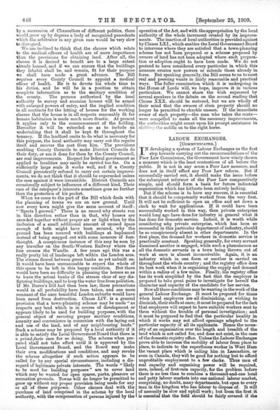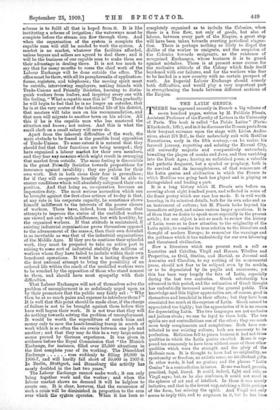I N developing a system of Labour Exchanges as the first
step towards carrying out the recommendations of the Poor Law Commission, the Government have wisely chosen a measure which is the least contentious of all before the public. It is not in any sense a Poor Law measure, and does not in itself effect any Poor Law reform. But if successfully carried out, it should make the issue before the subsequent reformer of the Poor Law comparatively simple, and should form a basis for future industrial organisation which has hitherto been entirely lacking. But if the scheme is to have any success, it is essential that it should be competently worked from the very first. It will not be sufficient to open an office and set down a clerk to wait for applications. If it could have been successfully worked in this way, then private enterprise would long ago have done for industry in general what it has done for domestic service. Indeed, it is worth while considering why private enterprise, which has been so successful in this particular department of industry, should be so conspicuously absent in other departments. In the first place, the demand for workers in domestic service is practically constant. Speaking generally, for every servant dismissed another is engaged, while such a phenomenon as all the domestic servants in a town being thrown out of work at once is almost inconceivable. Again, it is an industry which in one form or another is carried on throughout the whole country ; and the registry office does its best work when it is organising the supply and demand within a radius of a few miles. Finally, the registry office has its work simplified by the fact that the employer is prepared to take great pains to investigate for herself the character and capacity of the candidate for her service.
Now all these conditions may be wanting in the work of the general Labour Exchange. It must be prepared for times when local employers are all diminishing, or wishing to diminish, their staffs at once; it must be prepared for the fact that employers will expect to have suitable workers sent to them without the trouble of personal investigation ; and it must be prepared to find that the particular locality in which it works may not afford openings adapted to the particular capacity of all its applicants. Hence the neces- sity of an organisation over the length and breadth of the land which is not called for, and does not exist, in the case of the domestic registry office. Unless the Labour Exchanges prove able to increase the mobility of labour from place to place, to indicate to the superfluous worker in West Ham the vacant place which is calling him in Lancashire, or even in Canada, they will be good for nothing but to afford unprofitable employment to a few clerks. Thus men of real capacity and organising power will be required, men, indeed, of first-rate capacity, for the problem before them is no less than to combine a thousand-and-one local and petty labour markets into one national labour market, comprising, no doubt, many departments, but open to every man in the kingdom who has labour to dispose of. It will of necessity be slow and uphill work; but from the first it is essential that the field should be fairly covered if the scheme is to fulfil all that is hoped. from it. It is like instituting a scheme of irrigation : the waterways must be complete before the stream can flow through them. And when the organisation of the system is complete the capable man will still be needed. to work the system. A market is no market, whatever the facilities afforded, unless buyers and sellers are agreed to deal there ; and it will be the business of our capable man to make them see their advantage in dealing there. It is not too much to say that for many months to come the chief work of the Labour Exchange will be done outside the office. The office must be-there, with all its paraphernalia of application- forms, registers, and telephones ; the moving spirit must be outside, interviewing employers, making friends with Trade-Unions and Friendly Societies, learning to distin- guish workers from loafers, and inspiring every one with the feeling, " W hat a capable man this is !" Then gradually he will begin to feel that he is no longer an outsider, that he is at the very- centre of the industrial life of his district, that masters will take men on his recommendation, and that men will migrate to another town on his advice. All this if he is the capable man who has mastered. the situation and knows; not unless. And this is what the small clerk on a small salary will never do. Apart from the inherent difficulties of the work, the main obstacle to be feared. is the possible local opposition of Trade-Unions. To some- extent it is natural that they should feel that their functions are being usurped ; they have organised a labour market for their own members, and they fear any measure which might result in swamping that market from outside. The same feeling is discernible in the great Friendly Societies towards propositions for insurance against invalidity ; they are jealous for their own work. But in both cases their fear is groundless ; for if they will co-operate heartily they will be able to ensure conditions which will absolutely safeguard their own position. And that being so, co-operation becomes an imperative duty. The most serious accusation which can be brought against the first-class artisan of to-day is that, at any rate in his corporate capacity, he sometimes shows himself indifferent to -the interests of the poorer classes of workers. There have, indeed, been indications that attempts to improve the status of the unskilled workers are viewed not only with indifference, but with hostility, by the organised workers. If that attitude is maintained, if existing industrial organisations prove themselves opposed to the advancement of the masses, then their own downfall is as inevitable as was that of the industrial organisations of the Middle Ages. If they are to continue their splendid work, they must be prepared. to take an active part in raising to some sort of industrial stability the millions of workers whom they have failed to include within their own beneficent operations. It would. be a. lasting disgrace if the first national attempt to bring the possibility of an ordered life within the reach of the unskilled workers were to be wrecked. by the opposition of those who stand nearest to them, and should. have most sympathy with their difficulties.
That Labour Exchanges will not of themselves solve the problem of unemployment is so sedulously urged upon us by their promoters that the public may fairly ask : " Why then be at so much pains and expense to introduce them ? ' It is well that this point should be made clear, if the charge of failure is not to be brought against them before they have well begun their work. It is not true that they will do nothing towards solving the problem of unemployment. It would be worth the expenditure of much time and money only to save the heart-breaking tramp in search of work which is so often the via crude between one job and another ; and that they may do this to a very large extent seems proved by German experience. It was given in evidence before the Royal Commission that " the Munich Exchange, for instance, filled. over 25,000 situations in the first complete year of its working. The Dusseldorf Exchange . . . . . . rose suddenly to filling 28,000 in 1906-7, and will hardly fall short of 50,000 in 1907-8. Iii Berlin, Stuttgart, and Strasburg w the activity has nearly doubled in the last two years. The Labour Exchange cannot make work ; it can only bring together work and. the worker ; and when the labour market shows no- demand it will be helpless to create one.. It is clear, however, that the recurrence of such a crisis will be diminished in proportion to the area over which the system operates. When it has" been so completely organised as to include the Colonies, when there is a free flow, not only of goods, but also of labour, between every part of the Empire, a great step will have been taken towards averting periodical stagna- tion. There is perhaps nothing so likely to dispel the dislike of the worker to emigrate, and the suspicion of the Colonies towards emigrants, as the existence of recognised Exchanges, whose business it is to guard against mistakes. There is at present some excuse for the exclusive attitude of the Colony which finds itself burdened with our failures, and for the workers who fear to be landed in a new country with no certain prospect of work. An Imperial Labour Exchange should remedy both difficulties, and would. play a very important part in strengthens, g the bonds between different sections of the Empire.











































 Previous page
Previous page